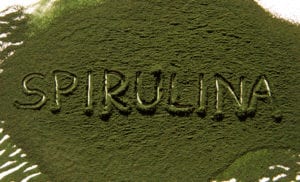Written by Taylor Woosley, Staff Writer. Results of the systematic review and meta-analysis of 20 RCTs with 1076 subjects shows that spirulina supplementation significantly increased HDL-C levels (p < 0.05), while significantly reducing LDL-C (p < 0.05), TC (p < 0.05), and TG levels (p < 0.05).
 Cardiovascular disease (CVD) is a leading cause of death and reduced quality of life and is only gaining in prevalence worldwide1. Dyslipidemia, an elevation in lipids such as total cholesterol (TC), low-density lipoprotein cholesterol (LDL-C), triglycerides (TG), and reduced high-density lipoprotein cholesterol (HDL-C), is an independent predictor of cardiovascular events2. Lipid and lipoprotein particles influence inflammatory processes as well as the function of leukocytes, vascular, and cardiac cells3.
Cardiovascular disease (CVD) is a leading cause of death and reduced quality of life and is only gaining in prevalence worldwide1. Dyslipidemia, an elevation in lipids such as total cholesterol (TC), low-density lipoprotein cholesterol (LDL-C), triglycerides (TG), and reduced high-density lipoprotein cholesterol (HDL-C), is an independent predictor of cardiovascular events2. Lipid and lipoprotein particles influence inflammatory processes as well as the function of leukocytes, vascular, and cardiac cells3.
Many available treatments aimed at reducing CVD risk factors often have side effects, leading people to focus on new treatment options, such as lifestyle changes and nutraceutical supplementation4. Spirulina is a cyanobacteria (blue-green algae) used as a nutritional supplement due to its high content of protein, essential fatty acids, vitamins, and polyphenols, with cardio-protective and antioxidant activity5. Research has shown that spirulina supplementation can improve lipid profiles, particularly by reducing TC, TG and LDL-C, and raising HDL-C6.
Rahnama et al. conducted a systematic review and dose-response meta-analysis to investigate the potential lipid-lowering effects of spirulina. Study inclusion consisted of following a parallel or crossover randomized controlled trial (RCT) design, including subjects 18 years or older who were being treated with spirulina, with a comparison between an intervention and control group. The Cochrane Quality Assessment Tool 1 was utilized to evaluate the risk of bias for each included study. Subgroup analysis was conducted with the following indicators: baseline means, age, baseline BMI, study design, spirulina dosage, duration of intervention, participants’ health condition, and overall quality. Additionally, effects of spirulina on the non-linear dose-response relationship and lipid profile were analyzed.
A total of 20 RCTs were included in the final analysis. Spirulina dosage across studies ranged from 0.02 to 10 g/day, with 16 studies having an intervention duration of 12 weeks or shorter, and 4 having a treatment duration of 12 weeks or more. Mean age of subjects was from 21.55 years to 66.5 years, with a total of 1067 participants being included in the studies. Majority of studies followed parallel designs, while 3 of the studies used crossover designs. Significant findings of the systematic review and meta-analysis are as follows:
- Pooled results show that spirulina supplementation significantly reduced LDL-C levels (SMD: -0.6, 95% CI: -0.9, -0.2, p < 0.05). Heterogeneity was high between studies (I2 = 97.1%, p < 0.00).
- Spirulina significantly increased HDL-C levels (SMD: 0.3, 95% CI: 0.0008, 0.6, p < 0.05), with significant heterogeneity being noted between studies (I2 =82.2%, p < 0.00). The significant effects of spirulina were observed with spirulina dosage <4 g/day, with a study duration of over 10 weeks.
- Meta-analysis results show that spirulina significantly decreased TC levels (SMD: -0.6, 95% CI: -0.9, -0.2, p < 0.05) and TG levels (SMD: -0.6, 95% CI: -0.96, -0.25, p < 0.05). Heterogeneity was observed to be high between studies (I2 = 86.7%, p < 0.00).
- Dose-response analysis shows that spirulina supplementation exhibited a linear improvement in HDL-C, with greatest improvement noted at 4 g/d (SMD: 2.86, 95% CI: 1.5, 4.1, p < 0.001). Furthermore, the most significant reduction in TC levels was shown after spirulina administration of 9 g/d (SMD: -13.1, 95% CI: -21.8, -4.4) and TG levels after spirulina supplementation was 6 g/d (SMD: -18.5, 95% CI: -33.6, -3.4).
Results of the systematic review and meta-analysis show that spirulina supplementation positively benefits lipid profiles. Spirulina effectively reduced TC, LDL-C, and TG levels, while increasing HDL-C levels. A study limitation is the heterogeneity of study results, particularly regarding the health status of subjects, baseline BMI levels, and the trial design.
Source: Rahnama, Iman, Seyyed Mostafa Arabi, Mahla Chambari, Leila Sadat Bahrami, Vahid Hadi, Sayid Mahdi Mirghazanfari, Manfredi Rizzo, Saeid Hadi, and Amirhossein Sahebkar. “The effect of Spirulina supplementation on lipid profile: GRADE-assessed systematic review and dose-response meta-analysis of data from randomized controlled trials.” Pharmacological Research (2023): 106802.
© 2023 The Author(s). Published by Elsevier Ltd. This is an open access article under the CC BY-NC-ND license (http://creativecommons.org/licenses/bync-nd/4.0/).
Click here to read the full text study.
Posted August 1, 2023.
Taylor Woosley studied biology at Purdue University before becoming a 2016 graduate of Columbia College Chicago with a major in Writing. She currently resides in Glen Ellyn, IL.
References:
- Steven S, Frenis K, Oelze M, et al. Vascular Inflammation and Oxidative Stress: Major Triggers for Cardiovascular Disease. Oxid Med Cell Longev. 2019;2019:7092151. doi:10.1155/2019/7092151
- Alloubani A, Nimer R, Samara R. Relationship between Hyperlipidemia, Cardiovascular Disease and Stroke: A Systematic Review. Curr Cardiol Rev. 2021;17(6):e051121189015. doi:10.2174/1573403×16999201210200342
- Soppert J, Lehrke M, Marx N, Jankowski J, Noels H. Lipoproteins and lipids in cardiovascular disease: from mechanistic insights to therapeutic targeting. Adv Drug Deliv Rev. 2020;159:4-33. doi:10.1016/j.addr.2020.07.019
- Hernández-Lepe MA, Manríquez-Torres JJ, Ramos-Lopez O, et al. Impact of Spirulina maxima Intake and Exercise (SIE) on Metabolic and Fitness Parameters in Sedentary Older Adults with Excessive Body Mass: Study Protocol of a Randomized Controlled Trial. Int J Environ Res Public Health. Feb 8 2021;18(4)doi:10.3390/ijerph18041605
- Hernández-Lepe MA, Wall-Medrano A, López-Díaz JA, et al. Hypolipidemic effect of arthrospira (spirulina) maxima supplementation and a systematic physical exercise program in overweight and obese men: A double-blind, randomized, and crossover controlled trial. Marine drugs. 2019;17(5):270.
- DiNicolantonio JJ, Bhat AG, J OK. Effects of spirulina on weight loss and blood lipids: a review. Open heart. 2020;7(1):e001003. doi:10.1136/openhrt-2018-001003
